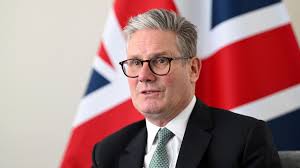Global Outcry: Nations Recognize Palestinian Statehood, Enraging Israeli PM Netanyahu

A significant diplomatic shift has recently occurred with Britain, Canada, and Australia formally recognizing Palestinian statehood, a move aimed at reviving the prospects of a two-state solution. This coordinated declaration by three Western nations, including the first G7 members to take such a step, has been met with a stark division of opinions globally, particularly a vehement rejection from Israeli Prime Minister Benjamin Netanyahu.
UK Prime Minister Keir Starmer announced Britain's recognition, stating it was to "revive the hope of peace for the Palestinians and Israelis, and a two-state solution." Similarly, Canadian Prime Minister Mark Carney affirmed Canada's recognition and offered partnership for a peaceful future. Australian Prime Minister Anthony Albanese underscored that Canberra's decision "recognises the legitimate and long held aspirations of the people of Palestine to a state of their own." These declarations, though carrying various conditions and emphases, reflect a global attempt to foster a viable path to peace amidst the ongoing conflict.
Immediately following these announcements, Israeli Prime Minister Benjamin Netanyahu issued a stern rebuke, stating, "I have a clear message for those leaders who recognise a Palestinian state after the horrific massacre on October 7: you are granting a huge reward to terror." He unequivocally declared, "it will not happen. No Palestinian state will be established west of the Jordan River," and further committed to doubling Jewish settlement in Judea and Samaria. Netanyahu views this international recognition as an attempt to impose a "terrorist state" on Israel, vowing a response after attending the UN General Assembly in New York.
Conversely, Palestinian President Mahmud Abbas welcomed the recognition by Britain, Canada, and Australia as a "necessary step toward lasting peace in the region." His office released a statement emphasizing that current priorities include achieving a ceasefire in Gaza, allowing humanitarian aid, securing the release of all hostages and prisoners, ensuring Israel’s complete withdrawal from the Gaza Strip, enabling the State of Palestine to assume full responsibilities, advancing recovery and reconstruction, and halting settlement activity and settler violence.
The wave of recognition extends beyond these three nations, with Portugal also announcing its move and other countries like Belgium, France, Luxembourg, Malta, and potentially New Zealand and Liechtenstein expected to follow. These nations, many of which are set to make formal announcements at a special UN conference, are part of a wider international effort to ostracize Hamas and challenge the Israeli government’s perceived attempts to diminish the possibility of a Palestinian homeland. French President Emmanuel Macron, identified as a galvanizing force behind this surge, warned against the Israeli government's approach, stating it "is to destroy the possibility of a two-state solution." He insisted that recognizing Palestine is not a reward for Hamas, which seeks an Islamic state and Israel's destruction.
However, this delicate diplomatic move is fraught with potential negative consequences. Fears persist that Israel might retaliate by annexing parts of the West Bank, which could trigger European trade sanctions and further political isolation for Israel, including a possible suspension from the UN. The United States and Israel have reportedly been boycotting meetings related to the two-state solution, with Israel maintaining the belief that the Palestinian Authority (PA), led by President Mahmoud Abbas, cannot be a credible partner for peace. The US State Department even attempted to block Abbas from speaking at the UN, a move that was overturned by a UN General Assembly vote.
Domestically in the UK, the decision by Prime Prime Minister Starmer has faced strong criticism from Conservative Party Leader Kemi Badenoch. She described the recognition as "absolutely disastrous," arguing that it "rewards terrorism with no conditions whatsoever put in place for Hamas" and fails to address the plight of hostages or civilian suffering. Badenoch accused Starmer of lacking a coherent plan and pandering to "the hobby horses of the Labour left" for political gain, linking it to other contentious policy stances.
As of 2025, approximately 146-151 UN member states, representing about 75-78% of the total, already formally recognize Palestine, with the Holy See also extending recognition. This growing international consensus highlights the ongoing pressure for a resolution to the Israeli-Palestinian conflict and the complex diplomatic landscape surrounding the establishment of a Palestinian state.
You may also like...
Genetic Engineering: Ethical Innovation or Pandora’s Box?

"Genetic engineering promises cures, better crops, and scientific breakthroughs—but is humanity ready for the ethical di...
UCL Explodes: Brawl and Red Card Rock Controversial Monaco vs Man City Thriller!

A dramatic Champions League match saw Manchester City draw against Monaco due to a controversial late penalty. Erling Ha...
PSG Stuns Barcelona, Ending Undefeated Run with Ramos' Late Strike!
)
Paris Saint-Germain triumphed over Barcelona with a 2-1 victory at the Olympic Stadium, sealed by a late Goncalo Ramos g...
Sean Astin Leads SAG-AFTRA's Fierce Stance on AI, Vows Fight for Fair Compensation

The emergence of AI performer Tilly Norwood has intensified the debate on technology's role in Hollywood, leading SAG-AF...
Quentin Tarantino's Legendary 'Kill Bill: The Whole Bloody Affair' Hits Theaters for the First Time Ever!

Quentin Tarantino's complete vision, "Kill Bill: The Whole Bloody Affair," will finally receive its first nationwide the...
Trump Adviser's ICE Threat at Bad Bunny's Super Bowl Performance Draws Jay-Z's Fierce Defense

Bad Bunny's selection as the 2026 Super Bowl Halftime Show headliner has sparked political controversy, with a Trump adm...
Hollywood Split Scandal: Nicole Kidman Reportedly 'Blindsided' by Keith Urban's New Romance

Actress Nicole Kidman is reportedly "blindsided" by her sudden divorce from country singer Keith Urban after 19 years of...
Shocking Confession: Robbie Williams Reveals Decades-Long Secret Battle with Tourette's

Robbie Williams has bravely opened up about his mental health, revealing his experience with “inside Tourette’s” and his...




